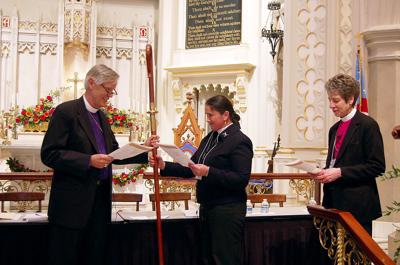The Episcopal Church and its local diocese have pitched a settlement offer that would allow 35 parishes that defected in 2012 to take roughly $500 million in church properties with them in a bid to end the long-running ecclesiastical split that has reached the state Supreme Court.
The parishes haven’t formally responded, but a high-ranking cleric said the olive branch will not be accepted. “It was unanimously rejected by all the parties to the litigation,” the Rev. Jim Lewis said.
The offer to end a protracted legal battle would include some of Charleston’s most historic colonial parishes: St. Philip’s and St. Michael’s churches in downtown Charleston, Old St. Andrew’s in West Ashley and Christ Church in Mount Pleasant.
In exchange, the national church would keep the Episcopal Diocese of South Carolina name and identifying marks, along with St. Christopher Camp and Conference Center, the bishop’s residence and trust funds worth several millions.
The Rt. Rev. Charles vonRosenberg, bishop of the diocese that remains with the national church, said he hopes the offer is a step toward reconciliation.
“You be who you are, and we be who we are, and let’s be brothers and sisters in Christ,” vonRosenberg said.
However, Lewis sees little reason to negotiate given a Circuit Court judge ruled strongly in their favor earlier this year, saying they had the right to leave and take their properties and the Diocese of South Carolina name and marks with them.
The S.C. Supreme Court set Sept. 23 to hear arguments in the lawsuit. “We are a hearing away from this case being settled for good and for all. It seems prudent to see that to the end,” said Lewis, canon to the ordinary for the Diocese of South Carolina, a group led by Bishop Mark Lawrence that left the national church in 2012.
Episcopal Church Presiding Bishop Katharine Jefferts Schori approved the settlement offer after nearly two years of internal discussions. It appears to mark the first time she has approved releasing so many church properties at once, said vonRosenberg and Thomas Tisdale Jr., chancellor of the diocese that remains with the national church. The offer comes shortly before Episcopalians hold their General Convention in Salt Lake City starting June 25, at which they will choose a new presiding bishop. Schori ends her tenure Nov. 1.
Among other sticking points to any settlement, historic parishes that were part of the Diocese of South Carolina before it joined the national church don’t want to give up their historic diocesan connection. Nor do they want to lose St. Christopher Camp, 314 acres of beach, marsh and forest on Seabrook Island where generations have gone to retreat and find Christ.
“It is dear to this diocese not just because it sits on valuable real estate but also because it has an invaluable place in the lives of parishioners of the diocese,” Lewis said. “It’s one of the most powerful tools of ministry the diocese has.”
Tisdale extended the offer June 1 and said it remains on the table.
Lewis said officials reviewed the offer and don’t believe it was made in good faith by people authorized to make it. They requested additional information directly from the national church, he added. “As of today, these have not been provided,” Lewis said.
They requested a written authorization “from the appropriate governing body of (The Episcopal Church)” confirming that Schori is authorized to make the offer, Lewis said. He questioned whether the presiding bishop has authority to approve it on her own.
The diocese also requested that The Episcopal Church submit the settlement offer, which came in a letter, with a signature from one of the national body’s attorneys. Tisdale, a local attorney, signed it.
Expensive legal clocks have been ticking for both sides in two separate lawsuits that have cost years of bitterness between one-time ecclesiastical brethren and millions in church money to pay attorneys and other court fees for every parish involved.
Acrimony between the feuding groups goes back years and even decades as progressive and traditionalist wings of The Episcopal Church splintered over scriptural interpretations related to everything from women’s ordination and homosexuality to the nature of salvation.
In all, five dioceses nationwide left The Episcopal Church, the American province of the global Anglican Communion.
In 2012, Lawrence and two-thirds of parishes in the Diocese of South Carolina, which spans the eastern half of the state, announced they were leaving and then sued the national church, arguing the diocese voluntarily joined the national church — and can leave as freely. They claim rights to the parishes’ properties along with the diocese’s name and identifying marks.
Also at issue is which bishop is the rightful head of the Diocese of South Carolina: Lawrence or vonRosenberg.
In a separate federal lawsuit, vonRosenberg sued Lawrence in 2013 after The Episcopal Church’s disciplinary board removed Lawrence from his ministerial duties. An Episcopal diocesan convention then elected vonRosenberg to replace Lawrence, the lawsuit contends.
The global Anglican Communion’s official website lists The Episcopal Church and The Episcopal Church in South Carolina, which vonRosenberg heads, as its recognized members. Therefore, Lawrence has been committing false advertising by presenting himself as bishop and should be stopped, partly because the similarity in diocesan names is confusing, the complaint contends. That case is ongoing.
“It is our hope to reconcile and that we can redirect money and expenses used in legal battles toward the mission of the church and greater fulfillment of what we are called to do,” vonRosenberg said.
Reach Jennifer Hawes at 937-5563 or follow her on Twitter at @JenBerryHawes.








